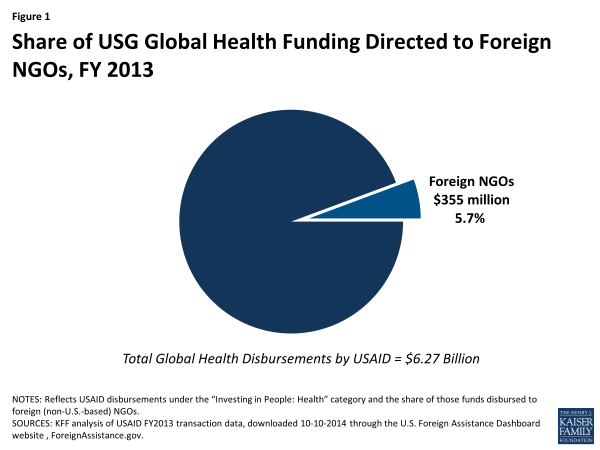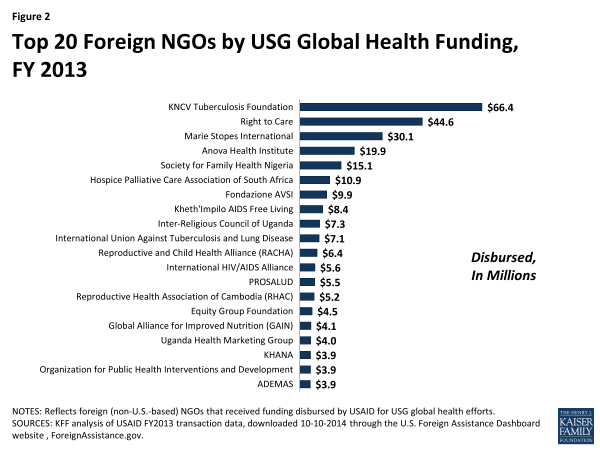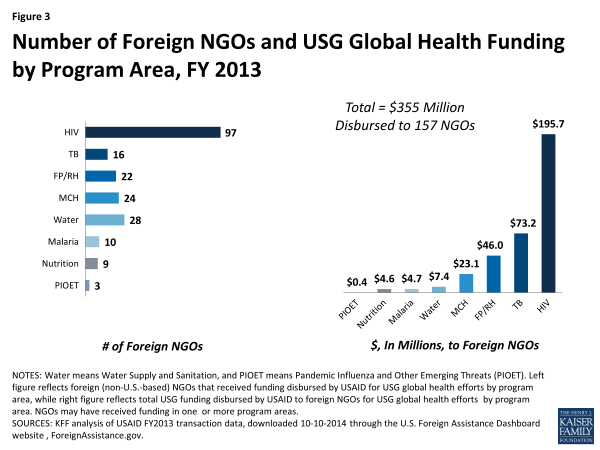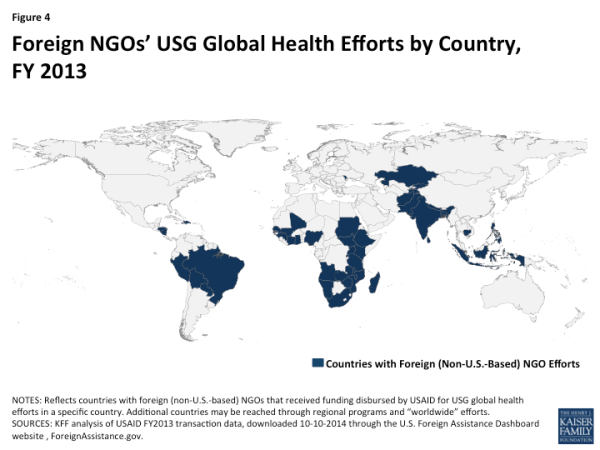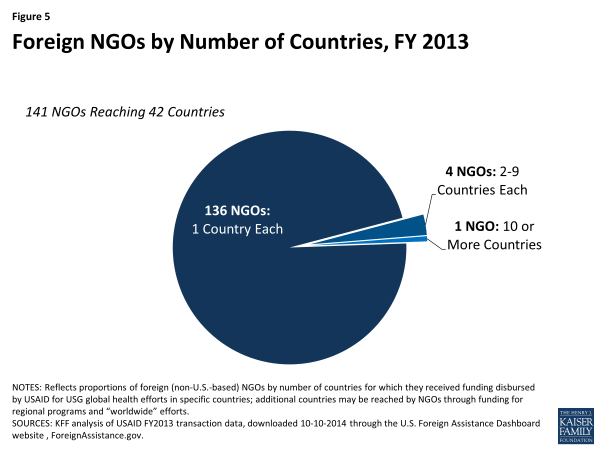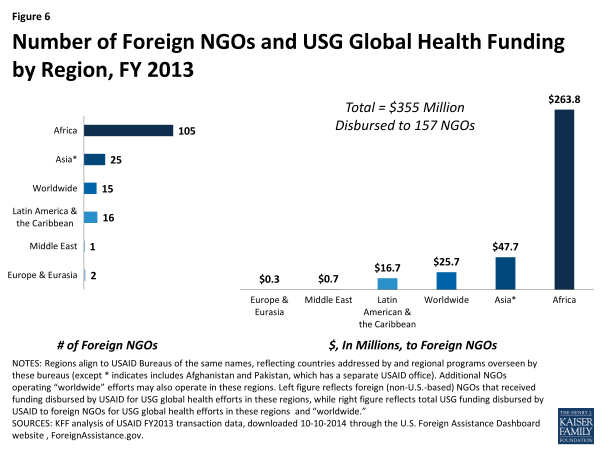Foreign NGO Engagement in U.S. Global Health Efforts: Foreign NGOs Receiving USG Support Through USAID
Kellie Moss
Published:
Executive Summary
Non-governmental organizations (NGOs) are key partners in U.S. global health efforts. A recent Kaiser report shed light on the role of U.S.-based NGOs in these efforts, finding that a significant share of U.S. government (USG) funding for global health is channeled to these NGOs, who often act as program implementers and conduct research and development efforts.1 To date, however, little information has been available about the extent of foreign NGOs’ role in carrying out U.S. global health programs. To help fill this gap, this report provides an analysis of foreign (non-U.S.-based) NGOs that received global health funding from the USG during FY 2013. The report focuses on funding provided to NGOs by the U.S. Agency for International Development (USAID), the largest implementer of global health activities among USG agencies and departments. The focus on USAID spending is due both to the availability of data from this agency and the fact that USAID spending represents the majority of bilateral U.S. global health spending.2 Key findings include (also see Table 1 below):
- Total Number of NGOs: In FY 2013, 157 foreign NGOs received USG global health funding through USAID to implement global health activities. They include NGOs working on a single global health issue, those working on multiple health issues, and those working on global health within a broader development scope. About 15% (24 NGOs) are faith-based organizations.
- Total Funding: Collectively, these NGOs received approximately $355 million (more than 5%) of USAID global health disbursements in FY 2013. The majority of this funding (75%) was concentrated among 20 NGOs. Funding amounts ranged from more than $10 million per NGO (6 NGOs) to less than $1 million (104 NGOs).
- Program Areas: NGOs carried out activities in nearly all major U.S. global health program areas. The greatest number of foreign NGOs worked on HIV. Additionally, the highest amount of funding was for HIV-related activities. Tuberculosis received the second highest amount of funding, followed by family planning/reproductive health.
- Geographic Presence: Foreign NGOs received USG global health funding through USAID for efforts carried out in 42 countries and across multiple regions, including Africa, Asia, Latin America and the Caribbean, and the Middle East. Some NGOs (15) implement efforts that are “worldwide” in scope, but most (146) are engaged in regional and/or country-specific programs. Nearly all funding to NGOs ($329.3 million) supports regional and country-specific efforts, while the remainder ($25.7 million) is directed to “worldwide” efforts. Among the 141 NGOs engaged in country-specific efforts, nearly all (136) received funding for efforts in a single country, while the remainder (5) received funding for efforts in two or more countries. Most countries (30 of 42) host activities by more than one NGO. Overall, more NGOs operate in Africa than in all other regions combined.
| Table 1: Summary of Foreign NGO Engagement in USG Global Health Efforts, FY 20133 | |
| # of NGOs | |
| 157 | |
| of which, 24 are faith-based organizations | |
| USG Global Health Funding Provided by USAID | |
| $355,004,250 | |
| to foreign NGOs | |
| # of NGOs by Program Area | |
| HIV | 97 |
| Water Supply and Sanitation | 28 |
| Maternal and Child Health | 24 |
| Family Planning/Reproductive Health | 22 |
| Tuberculosis | 16 |
| Malaria | 10 |
| Nutrition | 9 |
| Pandemic Influenza and Other Emerging Threats4 | 3 |
| Other Public Health Threats, including NTDs+5 | 0 |
| Countries Reached | |
| 42* | |
| NOTES: Reflects foreign (non-U.S.-based) NGOs that received funding disbursed by USAID in FY 2013 for USG global health activities. + NTDs are neglected tropical diseases. * Other countries may have been reached through regional programs or “worldwide” efforts. | |
Report
Introduction
Non-governmental organizations (NGOs) are key partners in U.S. global health efforts. The recent Kaiser report NGO Engagement in U.S. Global Health Efforts: Analysis of U.S.-Based NGOs Receiving USG Support Through USAID shed light on the role played by U.S.-based NGOs. It found that in FY 2013, the U.S. government (USG) channeled a significant share of funding for global health to U.S.-based NGOs, who often act as program implementers and conduct research and development efforts.1 To date, however, little information has been available about the extent of the role of foreign NGOs in carrying out U.S. global health programs.
To fill this gap in information, this report provides an analysis of foreign (non-U.S.-based) NGOs that received global health funding from the USG during FY 2013. Due to the parameters of the analysis as well as data limitations, this report focuses on USG funding that the U.S. Agency for International Development (USAID) received through direct appropriations and through interagency transfers (e.g., from the Department of State2), which together account for the majority of U.S. bilateral global health spending.3 Specifically, its findings are based on a Kaiser analysis of data on funding disbursed by USAID in FY 2013 to foreign NGOs implementing USG global health activities, which was downloaded from the USG’s Foreign Assistance Dashboard.4 Other sources of data included organizations’ websites, which were used to confirm organizations’ non-profit statuses and the locations of their headquarters/main offices implementing specific global health activities. (See Box 1 for the definition of foreign NGOs utilized in the analysis and Appendix A for a detailed methodology.) In addition to identifying these NGOs, this report examines their funding levels, program areas, and geographic focus.
Box 1: Definition of Non-Governmental Organizations (NGOs)
For the purposes of this analysis, to be eligible for inclusion, an organization had to meet the following definition of a foreign NGO: a non-profit that is independent of any government, not based in the United States, and not a university/college, a hospital, or a foundation that solely supports a government department/agency, hospital, or university. This definition was informed by the USAID definition of private voluntary organizations (PVOs),5 which guides a USAID registration process for NGOs.
Findings
Overview
In FY 2013, nearly 160 foreign NGOs received USG funding through USAID for carrying out global health activities. In FY 2013, 157 foreign NGOs received USG funding from USAID for implementing global health efforts (see Appendix B). They included NGOs that are focused mainly on a single global health issue, those working in multiple global health areas, and those addressing global health within a broader development scope. For example, The AIDS Support Organization (TASO), located in Uganda, provides services and support to people living with HIV; the Reproductive and Child Health Alliance (RACHA), located in Cambodia, provides a range of services, including those focused on family planning and reproductive health and tuberculosis, with an emphasis on capacity building; and Caritas Rwanda provides health services and supports rural development and food security programs.6 Among the 157 NGOs, there were also 24 faith-based NGOs,7 such as Lembaga Kesehatan Nahdlatul Ulama (LKNU), an Islamic organization in Indonesia, and the Church Alliance for Orphans (CAFO), an interfaith organization located in Namibia.8
Approximately $355 million – or more than 5% of USAID global health disbursements – was disbursed to foreign NGOs in FY 2013. Foreign NGOs received $355,004,250 in FY 2013 for USG global health efforts, which was about 5.7% of total global health funding disbursed by USAID that year (see Figure 1).9 This funding was provided to foreign NGOs through many of the functional and geographic bureaus at USAID, including the Bureau for Africa, Bureau for Asia, and the Bureau for Global Health.10
Most funding provided to NGOs was directed to a small number of organizations. Twenty NGOs accounted for the majority of funding (75% or $266.6 million) (see Figure 2). Among these, 6 received more than more than $10 million in disbursements each, collectively accounting for more than half of all funding (53% or $187.0 million). These were the KNCV Tuberculosis Foundation, Right to Care, Marie Stopes International, Anova Health Institute, Society for Family Health Nigeria, and Hospice Palliative Care Association of South Africa. On the other end of the funding range, 104 NGOs received less than $1 million each.
Program Areas
NGOs carried out USG global health efforts in nearly all of the major U.S. program areas. NGOs worked in eight of the nine global health program areas of the USG, including: HIV/AIDS; tuberculosis (TB); malaria; family planning/reproductive health (FP/RH); maternal and child health (MCH); nutrition; water supply and sanitation; and pandemic influenza and other emerging threats (PIOET).11 None received disbursements from USAID to work in the program area of other public health threats, which includes neglected tropical diseases (NTDs).12
Most NGOs received funding in a single global health program area. In FY 2013, 132 NGOs (84%) received support for efforts related to a single program area, while 25 (16%) received support for efforts related to more than one program area, including 7 that received funding for efforts related to four or more areas.
The program area involving the greatest numbers of NGOs was HIV, followed by water supply and sanitation. As Figure 3 shows, 97 NGOs worked on HIV and 28 on water supply and sanitation, followed by MCH (24), FP/RH (22), TB (16), and malaria (10). The fewest number of NGOs were involved in carrying out nutrition (9) and PIOET (3). The greatest amount of funding to foreign NGOs was for HIV efforts, followed by TB and FP/RH. (See Appendix C for a listing of NGOs by program area.)
Geographic Presence
Foreign NGO Headquarters
The headquarters of foreign NGOs were located most often in Africa, Asia, and Europe. The headquarters/main offices of foreign NGOs were in 47 countries. The greatest number were based in South Africa (22), followed by Uganda (11), the United Kingdom (10), Tanzania (7), and Indonesia, Kenya, Namibia, and Nigeria (6 each). Some NGOs may be based/have their headquarters in one country but conduct global health activities supported by USG funding in others.
Worldwide Efforts
More than a dozen NGOs provided “worldwide” support or focused on activities with global purposes.13 In FY 2013, 15 NGOs received funding for “worldwide” USG global health efforts; 11 received only “worldwide” funding, with the rest also receiving funding for country-and region-specific efforts. A small proportion of funding provided to foreign NGOs (7% or $25.7 million) was directed to such efforts. “Worldwide” activities may include providing technical assistance to field missions as part of certain project awards and carrying out globally-focused activities. For example, in FY 2013, funds considered to be for “worldwide” efforts were disbursed for field support activities related to nutrition and HIV led by the Global Alliance for Improved Nutrition (GAIN) and for operational research and other TB-related activities carried out by the International Union Against Tuberculosis and Lung Disease.
Regional and Country-Specific Efforts
More than 140 NGOs carried out regional and country-specific programs. In FY 2013, 146 NGOs received funding for regional and country-specific efforts, accounting for the vast majority of funding provided to NGOs (93% or $329.3 million).
- Regional efforts: 10 NGOs received funding for activities that spanned portions and/or the entirety of one or more of the following regions: Africa, Asia, Latin American and the Caribbean, and the Middle East.14 Two of these NGOs also received funding for “worldwide” efforts, and five also received funding for country-specific efforts.
- Country-specific efforts: More than three-quarters of NGOs (141) received funding for activities in specific countries. These activities spanned 42 countries (see Figure 4).15 Nearly all of these NGOs (136) received funding for efforts in one country (see Figure 5). Five received funding for efforts in two or more countries: KNCV Tuberculosis Foundation (14 countries), Marie Stopes International (9), the African Palliative Care Association (3), Fondazione AVSI (2), and the International Union Against Tuberculosis and Lung Disease (2).
Overall, more NGOs carried out regional and country-specific efforts in Africa than in all the other regions combined. As Figure 6 shows, 105 foreign NGOs received funding for region- and country-specific projects in Africa. About a quarter as many (25) received funding for projects in Asia, and fewer received funding for projects in other regions. Most regional/country funding was also directed to efforts in Africa, followed by Asia.
Most countries hosted more than one NGO, with a few hosting 10 or more NGOs. In FY 2013, the 42 countries reached by NGOs’ country-specific efforts hosted activities by varying numbers of NGOs. Twelve countries hosted activities by one NGO, and 30 countries hosted activities by more than one NGO. The numbers of NGOs implementing USG global health efforts were often highest among countries in sub-Saharan Africa (see Figure 7). Three of these countries hosted activities by 10 or more NGOs: South Africa (19), Tanzania (14), and Uganda (14).
Most of the countries with the highest levels of NGO funding are in sub-Saharan Africa. In FY 2013, among the 13 countries with the highest country-specific USG funding to foreign NGOs (see Figure 7), 9 are in sub-Saharan Africa. Funding to NGOs exceeded $10 million in each of 8 countries and was highest in South Africa ($97.8 million), followed by Uganda ($47.1 million) and Nigeria ($31.6 million). On the other end of the funding range, USG funding to foreign NGOs was less than $1 million in each of 16 countries.
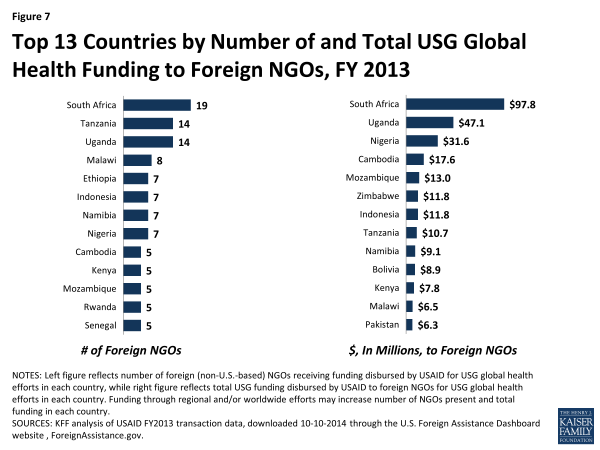
Figure 7: Top 13 Countries by Number of and Total USG Global Health Funding to Foreign NGOs, FY 2013
Conclusion
As the findings of this report have shown, foreign NGOs play an important role in carrying out USG global health efforts. Greater understanding of the extent of foreign NGO engagement in these efforts can be elucidated by further analysis, as data on USG global health funding for such NGOs become increasingly available publicly and as the quality and clarity of these data improve. The USG has taken important steps in recent years to make funding and project data more available and easily accessible, but further attention is still required to fill in gaps in data – particularly with regard to USG funding sources beyond USAID – and to ensure the quality and completeness of existing USG data resources. Such data are critical to evaluating whether investments in these NGOs further achievement of USG global health goals. The findings of this report suggest that the role of foreign NGOs will be important to consider in understanding USG global health efforts going forward, particularly given the growing USG emphasis on country ownership and transitioning USG global health efforts to country and local control.
Appendices
Appendix A: Detailed Methodology
This report is based on Kaiser Family Foundation analysis of USAID global health funding data for FY 2013, which were downloaded from the U.S. Foreign Assistance Dashboard website.1
The analysis uses transaction-level data on funding disbursed by USAID to foreign NGOs for global health activities. Data include funding that was appropriated by Congress to USAID for global health activities and then disbursed to NGOs, as well as funding that was appropriated to other agencies for global health efforts, transferred to USAID, and then disbursed to NGOs.2 Due to data limitations on the Dashboard and the parameters of this analysis, the data does not include funding disbursed by other USG departments/agencies (such as the Department of State or the Centers for Disease Control and Prevention) to NGOs. Still, this analysis captures the majority of bilateral U.S. global health funding disbursements.3
Additionally, note:
- To be eligible for inclusion in this analysis, an organization had to meet the following definition of a foreign NGO: a non-profit that is independent of any government, not based in the United States and not a university/college, a hospital, or a foundation that solely supports a government department/agency, hospital, or university. Each organization’s non-profit status as well as headquarters location was confirmed using data found on organizations’ websites.
- Funding totals shown in this report represent net disbursements, which include positive and negative disbursed funding amounts as well as zero-dollar disbursed funding amounts. For zero-dollar transactions, we included only transactions we could verify as no-cost extensions.4
- Data on health funding provided under the American Schools and Hospitals Abroad (ASHA) program were not included in NGO funding totals but were included in the overall global health funding total ($6.27 billion).
Appendix B: Foreign NGOs, FY 2013
| Table B: Foreign NGOs Implementing USG Global Health Efforts, FY 20135 | ||
|
|
|
| NOTES: Includes foreign (non-U.S.-based) NGOs to which USAID disbursed USG global health funding in FY 2013. | ||
Appendix C: Foreign NGOs by Program Area, FY 2013
| Table C: Foreign NGOs Implementing USG Global Health Efforts by Program Area, FY 20136 | ||||
|
Malaria
10
|
HIV
97
|
TB
16
|
||
|
|
|
|
|
|
FP/RH
22
|
MCH
24
|
Nutrition
9
|
||
|
|
|
|
|
|
Other
Public Health Threats, Including NTDs 0
|
Water Supply and Sanitation
28
|
Pandemic Influenza and Other Emerging Threats
3
|
||
|
|
|
|
|
|
NOTES: Includes foreign (non-U.S.-based) NGOs to which USAID disbursed USG global health funding, by program area, in FY 2013.
|
||||
Endnotes
Executive Summary
Kaiser Family Foundation (KFF), NGO Engagement in U.S. Global Health Efforts: Analysis of U.S.-Based NGOs Receiving USG Support Through USAID, Dec. 2014.
Based on KFF analysis of data from the U.S. Foreign Assistance Dashboard website, ForeignAssistance.gov.
KFF analysis of USAID FY2013 transaction data, downloaded 10-10-2014 through the U.S. Foreign Assistance Dashboard website, ForeignAssistance.gov, as well as information from NGO websites.
Pandemic Influenza and Other Emerging Threats includes efforts to mitigate the possibility that a highly virulent virus could develop into a pandemic by strengthening targeted countries’ ability to detect cases early and to apply appropriate control measures quickly. According to USAID congressional budget justifications, http://www.usaid.gov/results-and-data/budget-spending/congressional-budget-justification.
Other Public Health Threats also addresses dangers posed by infectious diseases not included elsewhere, such as cholera, dengue, and meningitis; significant non-communicable health threats of major public health importance; the containment of antimicrobial resistance; and the crosscutting work on surveillance that builds capacity for outbreak preparedness and response. According to USAID congressional budget justifications, http://www.usaid.gov/results-and-data/budget-spending/congressional-budget-justification.
Report
KFF, NGO Engagement in U.S. Global Health Efforts: Analysis of U.S.-Based NGOs Receiving USG Support Through USAID, Dec. 2014.
For example, USAID transaction data analyzed for this report include funds transferred from the Department of State to USAID for HIV efforts, which were then obligated and eventually disbursed to foreign NGOs.
Based on KFF analysis of data from the U.S. Foreign Assistance Dashboard website, ForeignAssistance.gov. This analysis does not include funding directly disbursed to foreign NGOs by other USG agencies.
Downloaded 10-10-2014 through the U.S. Foreign Assistance Dashboard website, ForeignAssistance.gov.
PVOs are a subset of the wider NGO community and “are tax-exempt nonprofits that leverage their expertise and private funding to address development challenges abroad [outside the U.S.].” USAID, “PVO Registration,” webpage, http://www.usaid.gov/pvo.
TASO website, http://www.tasouganda.org/; RACHA website, http://www.racha.org.kh/; Caritas Rwanda website, http://www.caritasrwanda.org/index.php/en/.
The 24 faith-based NGOs are: African Enterprise International, Caritas Rwanda, Caritas Senegal, Catholic AIDS Action, CCAP Nkhoma Synod Relief and Development, Christian Health Association of Nigeria, Christian Health Association of Malawi, Christian Social Social Service Commission, Church Alliance for Orphans, Fondazione AVSI, Fundacion PRODEIN, GECHAAN, Inter-Religious Council of Uganda, Kigezi Diocese Water and Sanitation Project, LKNU, Life in Abundance, Mildmay, Partners in Hope, PASADA, Lifeskills Promoters, Retrak, Roman Catholic Diocese of Timika, Tshwane Leadership Foundation, and YWCA of Nigeria. It is important to note, however, that other organizations may identify as secular but have religious principles undergirding their work. For example, the work of the Joint Medical Store, which was established as a joint venture between the Uganda Catholic Medical Bureau and the Uganda Protestant Medical Bureau; see http://www.jms.co.urg.
LKNU website, http://www.lknu.org/; MSH, “Commitment to and passion for early childhood development in Namibia: three remarkable ECD centers,” short story, April 2014.
About 37% of total global health funding disbursed by USAID that year was directed to more than 130 U.S.-based NGOs. See KFF, NGO Engagement in U.S. Global Health Efforts: Analysis of U.S.-Based NGOs Receiving USG Support Through USAID, Dec. 2014.
The other relevant bureaus are: Bureau for Latin America and the Caribbean; Office of Afghanistan and Pakistan Affairs; Bureau for the Middle East; Bureau for Economic Growth, Education and Environment (previously known as the Bureau for Economic Growth, Agriculture, and Trade (EGAT)); and U.S. Global Development Lab (incorporates the former Office of Innovation and Development Alliances (IDEA) and Office of Development Partners (ODP)); and Bureau for Europe and Eurasia. Additionally, a very small amount of funding was designated for the “Recovery” organizational unit.
- Pandemic Influenza and Other Emerging Threats includes efforts to mitigate the possibility that a highly virulent virus could develop into a pandemic by strengthening targeted countries’ ability to detect cases early and to apply appropriate control measures quickly. According to USAID congressional budget justifications,http://www.usaid.gov/results-and-data/budget-spending/congressional-budget-justification.
Other Public Health Threats also addresses dangers posed by infectious diseases not included elsewhere, such as cholera, dengue, and meningitis; significant non-communicable health threats of major public health importance; the containment of antimicrobial resistance; and the crosscutting work on surveillance that builds capacity for outbreak preparedness and response. According to USAID congressional budget justifications, http://www.usaid.gov/results-and-data/budget-spending/congressional-budget-justification.
In the transaction data, the USG designated the “benefitting location” for this funding as “worldwide.”
In addition to “worldwide” support, regions/sub-regions mentioned in the data included: Africa, East Africa, South Africa, Caribbean, East Asia, and the Middle East.
In addition to the countries listed below, other countries may have been reached through regional efforts. Afghanistan, Angola, Bangladesh, Bolivia, Brazil, Cambodia, Cote d'Ivoire, Dominican Republic, Ethiopia, Ghana, Guinea, Haiti, Honduras, India, Indonesia, Kazakhstan, Kenya, Kyrgyzstan, Madagascar, Malawi, Mali, Moldova, Mozambique, Namibia, Nepal, Nicaragua, Nigeria, Pakistan, Paraguay, Peru, Philippines, Rwanda, Senegal, South Africa, South Sudan, Sri Lanka, Sudan, Tajikistan, Tanzania, Uganda, Zambia, and Zimbabwe.
Appendices
Downloaded 10-10-2014 through the U.S. Foreign Assistance Dashboard website, ForeignAssistance.gov.
For example, USAID transaction data analyzed for this report include funds transferred from the Department of State to USAID for HIV efforts, which were then obligated and eventually disbursed to foreign NGOs.
Based on KFF analysis of data from the U.S. Foreign Assistance Dashboard website, ForeignAssistance.gov.
Positive and negative disbursements along with zero-dollar disbursements that are no-cost extensions are each closely linked to the recent completion or ongoing execution of global health activities, providing the best approximation available for showing where work is being done.
KFF analysis of USAID FY2013 transaction data, downloaded 10-10-2014 through the U.S. Foreign Assistance Dashboard website, ForeignAssistance.gov, as well as information from NGO websites.
KFF analysis of USAID FY2013 transaction data, downloaded 10-10-2014 through the U.S. Foreign Assistance Dashboard website, ForeignAssistance.gov.

